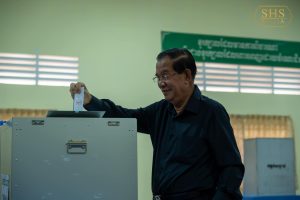Cambodia’s ruling party has unsurprisingly claimed victory in yesterday’s Senate elections, claiming to have won an overwhelming majority of the seats in the upper house.
“The CPP won at least 50 of the 58 Senate seats up for grabs, or more than 80 percent of the total votes,” Sok Eysan, a spokesperson for the Cambodian People’s Party (CPP), told China’s state media agency Xinhua, citing preliminary results.
“This is another great success for the CPP after we won a landslide victory in the general election in July 2023,” he added. Kyodo News cited another official as saying that the CPP had won 55 seats, with the remaining three going to the Khmer Will Party, a party associated with the disqualified Candlelight Party.
Whatever the exact result, a CPP “victory” was never in doubt – and not just for the usual factors to do with the suppression of the political opposition. The Senate is elected only indirectly: of the 62 seats in the chamber, 58 are selected by the 125 members of the National Assembly and members of the country’s 1,652 commune councils – an electorate totaling just 11,747 people.
Most of these belong to the CPP. At the commune council elections in 2022, the CPP won 74.3 percent of the vote, which handed it 9,376 of the 11,622 available commune council seats. Added to the CPP’s dominant share of the National Assembly, where it holds 120 of 125 seats, some 80.8 percent of the electorate was made up of its elected officials. (An additional two Senate positions are appointed by the King, and two are chosen by the National Assembly.)
This meant that the results of the 2022 commune election and the 2023 national election, in which the opposition was hobbled prior to election day – or ruled out of participating entirely, in the former case – were simply reproduced in yesterday’s election result.
Accordingly, little is likely to change. While the CPP’s representation in the body will drop slightly from its current slate of 58 seats, it will still hold a supermajority, necessary to wave through legislation from the National Assembly.
The most significant result of the election was also announced ahead of time: the elevation of former Prime Minister Hun Sen to the presidency of the Senate, something that Sok Eysan confirmed in his comments to Xinhua.
The Senate presidency is a mostly ceremonial position that will add to the long line of figurehead positions that the 71-year-old Hun Sen has taken up since relinquishing the prime ministership to his son Hun Manet last August. It nonetheless has one important power: the duty of serving as acting head of state when the King is out of the country, with the power of signing legislation into law. As I argued last week, there is little reason to think that an opponent could make use of this position to undermine the CPP’s power or that of the Hun clan, but putting Hun Sen in the position ensures that the party’s control remains air-tight.
Hun Sen’s occupation of the position also reflects the “guardianship” role taken on by the old guard CPP leaders as they have stepped back from frontline political roles.
All told, the pre-ordained Senate election and the elevation of the country’s former leader to the post of Senate president reflects the latest step in the generational power transition that culminated in last year’s handover of the prime ministership to Hun Manet, which is designed to solidify the CPP’s control of Cambodia, and the Hun family’s control of the CPP, for the foreseeable future.

































